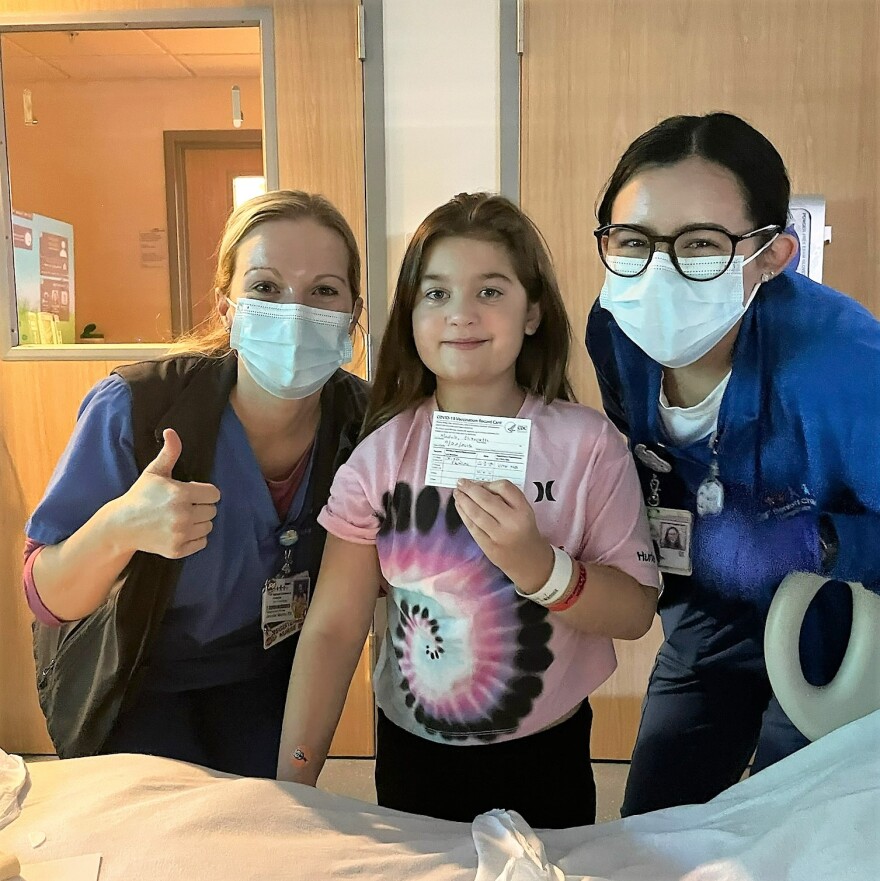On Nov. 3, 2021, the Food and Drug Administration announced that children between the ages of 5 and 11 — elementary school-aged kids — would now be eligible for the Pfizer-BioNTech COVID vaccine, and within a week from that announcement, the White House said around 1 million children got their first shot.
That’s a big number, and it’s an exciting development in the fight to end the pandemic in the United States, but it leaves around 27 million kids who are now eligible to receive the shot, who have not yet gotten their first dose.
That’s not really a surprise. It’s taking a time for doctors' offices, clinics and pharmacies to stock up on the differently packaged, kid-sized vaccine doses, and initial demand has been high. So it’s going to take some time to get vaccines into every waiting elementary school kids’ arms. There’s a line right now.
But if the vaccine roll-out in this age group follows the pattern set by other age groups, we can expect that early rush to vaccinate to slow down significantly as the weeks go by.
In fact, a lot of parents say they will take a wait-and-see approach with their kids and the vaccine, letting the eager parents and their kids go first. They want to see what happens, or they have questions about the vaccine and their kids and don’t know who to ask.
In this episode of TPR's Petrie Dish podcast Your Local Epidemiologist Katelyn Jetelina and pediatrician Dr. L.E. Wolovitz answer several of those questions.
Highlights:
Do children get sick with COVID-19?
Jetelina: More than 1.9 million 5- to 11-year-olds have been infected by COVID-19, with more than 8,300 hospitalizations among this age group. COVID-19 has jumped to the sixth leading cause of death in this age group. Kids aren't supposed to die, but COVID is getting to a few select unlucky kids. And this vaccine makes this a preventable disease.
Wolovitz: At one point, we had 17 children in the ICU at Children's (in Dallas) with COVID-19. So we're absolutely seeing that children can get very sick. Now, the majority do fine. But I think one of the things that is so worrisome, too, is that during this delta wave where we're seeing an increase in pediatric hospitalizations, like we hadn't seen prior in the pandemic, 32% of those kids were previously healthy kids with no underlying conditions.
What about the risk of vaccine-induced myocarditis in this age group?
Jetelina: Myocarditis is a concern, and that was a concern that we identified through our surveillance system about one month after the adolescent vaccine.
It's a true safety signal. So it's been shown to be directly caused by the vaccine, but it's incredibly rare.
So because it's incredibly rare, no cases of myocarditis popped up during this five to 11 year old clinical trial.
How do you prepare your 5 to 11 year old to get the vaccine on shot day?
Wolovitz: Make sure that your child is fever free and feeling well on the day of the vaccine. Since it's cold out, the vaccine is going to be administered in the arm, so it'd be helpful to wear a T shirt under your sweater or jacket.
The recommendation is that children be observed for 15 minutes after their vaccine. If the child has a history of anaphylaxis to anything and you regularly carry an EpiPen, this would be a good time to still bring your EpiPen, although any vaccine administrator should also have an EpiPen. But if your child has a history of anaphylaxis, this would be a good time just to bring it just to be safe.
Listen to Petrie Dish for many more questions and many more answers on elementary school aged kids and the COVID vaccine. You can also find much more information from the Centers for Disease Control and Prevention.





